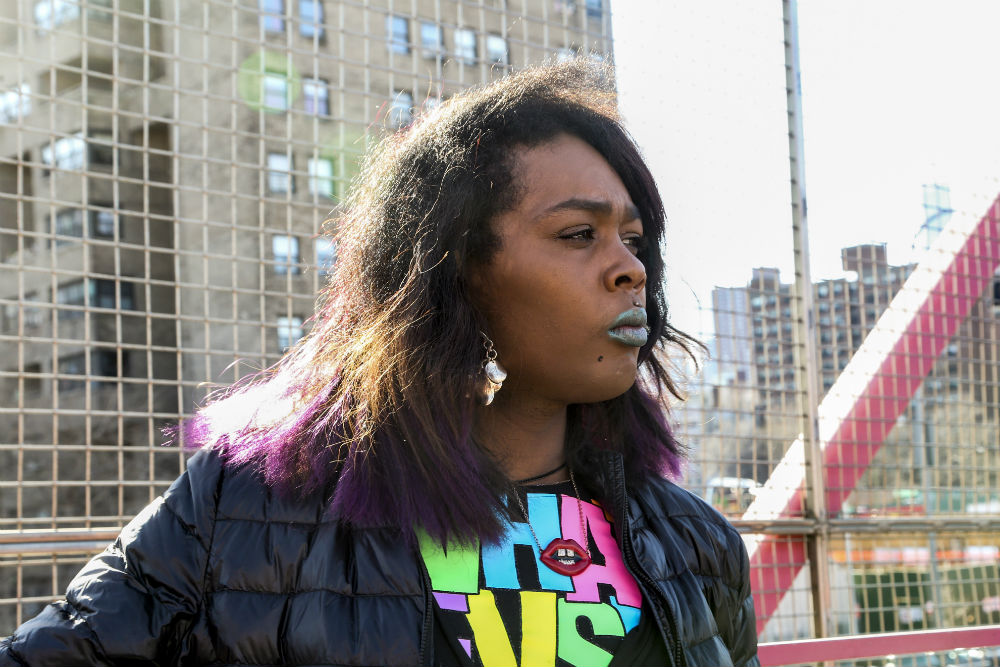Thirty-seven-year-old ShaGasyia Diamond and 27-year-old Genuwine Beauty are spending Halloween afternoon at a recording studio with music producer Idris Swatts. It’s a makeshift set-up: a gray, box-sized recording booth and a desk that sits in the corner of a living room.
Beauty — outfitted in a tank top, black winter skully hat, and painted-on cat whiskers — helps Diamond recite her lines before she enters the booth’s orange incandescence and gets to work. With Swatts stationed at a laptop, the elastic instrumental starts and Diamond, in her cat-ear headband, sings the hook: “If I do it once / You better believe it boy, I can do it twice.”
When she finishes, Swatts partially lifts his cap and scratches his head before chiming in with some direction: “I feel like that was just a sound check. I really want to hear you go in.”
With a nod, she performs the song again and then once more. The back-and-forth process continues until they finally emerge with a raw version of “Bettabelieveit,” where Diamond flows from an R&B hook to animated rapping. It’s roughly mixed with the vocal level markedly higher than the rest of the production. Still, this was a few hours well-spent for Beauty, the MC, and Diamond, the singer/rapper.
Studio sessions like these — where creative dialogue exists for the sake of good art — are not a commonality for Beauty and Diamond, two transgender women who’re struggling to survive not just as artists but as people living in New York City. The Swatts session costs $30 per hour, a fraction of the amount for the denser major-label production that can run up to thousands of dollars per day. Beauty and Diamond aren’t working with that much disposable funding. Diamond lives off of a fixed income while Beauty is forced to sell drugs to support herself and career hopes, as they’re rarely paid for their frequent live performances. They’re two of the thousands of transgender civilians who’re fighting against a substandard way of living.
Members of the transgender community face harsh conditions rarely seen by the average American’s eye. According to Injustice at Every Turn, a report published in 2008 by the National LGBTQ Task Force, transgender people experience unemployment at twice the rate of the general population. The report — based on data collected from 6,450 individuals from across the country — also found that transgender people are four times more likely than the general population to have an annual household income of less than $10,000. In 2011, the Williams Institute, a sect of the UCLA School of Law that focuses on sexual and gender identity law, estimated that roughly 700,000 Americans identify as transgender. There’s no accurate census for a number of reasons, among them a fear of discrimination, per the New York Times; life is infinitely harder for those who openly identify as trans.
Of course, success for trans people isn’t impossible. Someone like actress and activist Laverne Cox — who appeared on the cover of Time magazine in 2014 and became the first transgender person to be nominated for an Emmy, for her role on the hit Netflix series Orange Is the New Black — has gained a level of prominence that would’ve been unthinkable even ten years ago, when the cultural landscape was much less open-minded than it is now. But Cox is very much the exception. Beauty and Diamond are simply trying to live well above the poverty line and make their voices heard. Recording a good take of “Bettabelieveit” is a small but worthwhile step toward completing that mission. So on that Saturday afternoon, Swatts glares at his laptop, Beauty nods along to the beat, and Diamond croons in that booth.
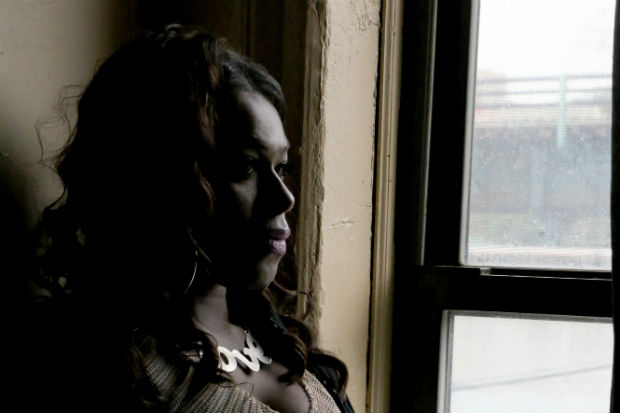
Ebullient in person, Diamond smiles often and interrupts herself with amicable giggles as she talks about her life, regardless of how unpleasant the details are. Her optimism clothes her previous trauma. After spending her childhood in Arkansas and Memphis, Diamond moved to Michigan to tend to her ailing mother. She says she ended up spending her twenties in a men’s prison for an armed robbery conviction. Although she doesn’t get into much detail regarding what she actually did, Diamond admits to committing the crime at 20 years old because she was desperate to continue funding her transition process. “It was a thing of realistically being a young trans teen and being a young trans adult and not having those resources and not having those doors opened,” she says.
Diamond says that during her decade-long prison sentence in Michigan, she spent some time as a recluse, staring at her fellow inmates through her prison window as she was crippled by depression. She wonders if she’ll ever sing some of the lyrics she wrote during those days. “Just going back to that frame of mind is definitely triggering,” she says. “Certain aspects of my music — I don’t know if I should actually sing or if I should let somebody else sing it.”
But Diamond drew inspiration from the bleakness. When she was a 5-year-old going to a Memphis Christian church, her mother discovered that she was born with natural singing talent. She wanted Diamond to perform with her church’s choir on Easter Sunday, which is traditionally one of the religion’s biggest services. Diamond stayed away from the stage because of her insecurities, fearing her effeminate voice “may not be manly or boyish enough.” Writing allowed her to feel free spiritually, even while she was behind prison bars.
“It wasn’t until I was incarcerated that I became more free,” Diamond says, realizing her imprisonment “was just a state of mind.”
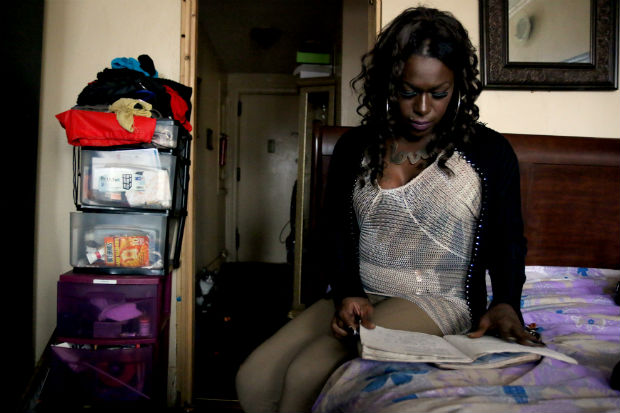
Diamond has spent her thirties making up for lost time. In 2012, she moved from Michigan to New York City to focus on her music career at an age where many artists — especially in hip-hop — are considered past their creative prime. But the city is unkind to newcomers’ dreams and indifferent to their struggles. Diamond is no exception; she spent her first few months amongst the tens of thousands living within the harsh shelter system. “Being a person who was formerly incarcerated, I just felt like it was prison all over again,” Diamond remembers.
That system is also calloused toward Diamond’s friend, Genuwine Beauty, an aspiring rapper who’s been transitioning since 2014. After moving from Virginia to New York last June, she’s currently living in a women’s shelter in Manhattan, after a landlord kicked her out of her ex-girlfriend’s place because she wasn’t on the lease. She says she was at one time placed in a mental health shelter for being transgender. It’s not uncommon for the shelter system to classify a transgender person as mentally ill, according to Victoria Rodriguez-Roldan, Director of the Trans/Gender Non-Conforming Justice Project of the National LGBTQ Task Force. “There have been many cases anecdotally,” Rodriguez-Roldan says, “and we have started trying to do research to find how many instances [there are] of trans people being discriminated against by being assumed to be mentally ill.”
For Beauty, it exacerbated an already demoralizing situation: “My friend had an altercation: A girl just came and randomly spit on her for no reason. It’s crazy. People want to judge you because you’re transgender and they want to call the police and get you kicked out. It’s like a madhouse in there.”
Diamond has since left that system behind. In 2013, she settled into a Brooklyn apartment for a few months before moving up to her current residence in the Bronx’s Allerton neighborhood, where streets are walked by working-class people and overshadowed by MTA train tracks. Beauty, on the other hand, has been working her way out.
She’s establishing herself as a rapper in New York, an improbable goal in a city full of aspiring songwriters. In 2014, Beauty was still known as the artist Reason, whose inactive but still-accessible SoundCloud profile reveals her dedication to lyricism; she freestyles about a “life so complicated” and spits ribald punchlines (“F**k the game up, dog / Straight long dick, I think I need some medicine”) over Childish Gambino’s 2011 “Bonfire” instrumental. Elsewhere, she’s throwing braggadocio over aggressive, trap-based production. Reason sounds confident, but her voice is noticeably distorted and muffled on these mixes.
Beauty’s current output has the same dynamic: amateur recording quality offset with an emphasis on lyrics. In her slight, Southern drawl, Beauty explains that the gender transition doesn’t inform her music as much as her desire for wider recognition. Some of her more recent SoundCloud additions feature her rhyming over instantly recognizable Southern anthems (Crime Mob’s 2004 hit “Knuck If You Buck”), melodic minimalism (French Montana’s “Don’t Panic”), and Beyoncé (the endlessly remixed “Drunk in Love”).
Despite their efforts, Beauty and Diamond sometimes aren’t taken seriously by potential collaborators, who shy away from associating with trans performers.
“[The general population] dwells on you as if you’re nobody,” Beauty says. “You’re just a guy in drag, a wig and all this stuff. They establish us as different people instead of people who just do music period.”
Diamond says she’s had situations where she was shunned by people in the industry once they learned she was transgender. Some wanted her to fit a typically cisgendered image, ignoring her personal story while pushing her to become some facsimile of Beyoncé or Nicki Minaj. One wanted her to outright hide who she was.
“There was another studio [a friend] tried to get me to go to. She was like, ‘You gotta dress like a boy in order to come,’” Diamond says. “I haven’t dressed as a boy in over 20 years, so to ask me to do something like that is insulting.”
“This isn’t for fun or this, that, and the third,” Beauty says. “These are people’s lives.”
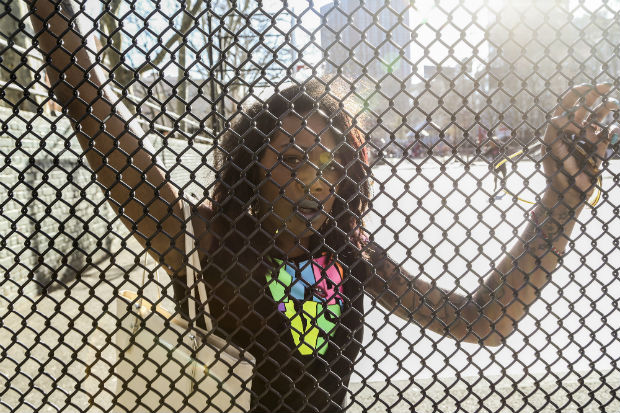
Artists earn a major label’s attention through a variety of ways — say, strong local support, or a steady stream of mixtape success. Beauty and Diamond are a ways away from achieving those: They’ve never released a project or an EP, and they haven’t been in New York long enough to build a substantial, loyal fanbase.
For now, Diamond remains an independent artist, which puts distribution and promotional duties on her shoulders. Despite the added burden, she did end up performing at last year’s Afropunk Music Festival, Brooklyn’s weekend-long showcase highlighting alternative African-American musical acts. Diamond was the star of a coordinated stage protest for black transgender women’s right to live without lethal prejudice. Dressed in all black, Diamond delivered an a capella performance of her own “I Am Her,” a darkly autobiographical ballad: “There’s an outcast in everybody’s life and I am her.” She made some new fans in that vast, predominantly black crowd, the largest of her still-young career.
“I didn’t realize how many people had actually heard me sing until after I got off the stage,” Diamond says, looking back. “There were people walking up to me like, ‘Oh my God, that’s so awesome.’”
Beauty has found a similar sanguine spirit in Stan Lucas, who manages the Trans Entertainment Network — a label and artist management company that represents trans musicians, fashion designers, and models. Lucas has been managing mainly “straight, hardcore hip-hop” artists since 2006. But the Atlanta resident has dated transgender women, so he’s witnessed the abuse. “Living with my girlfriend, I know what [people in the trans community] go through,” he says. “It’s hard — just everyday dealing with society.”
In the past, Lucas had been approached by transgender artists looking for him to manage them, but he says he hesitated out of fear of embarrassing his male clients. He finally took a chance, in July 2014, before the fourth-annual Atlanta Underground Music Awards. The ceremony is regularly preceded by a week-long stretch of events, and that year, Lucas decided to throw in an LGBT night that showcased the community’s potential talent in the music and fashion industries. Performers approached Lucas afterwards to tell him they needed spaces like these.
It was enough feedback to inspire him to found the Trans Entertainment Network. T.E.N.’s formal introduction took place at a March 2015 showcase held at Club Kryptonite, which sits in a northwest suburb of Atlanta. The mix of a “Rip the Runway-type show” and a concert came after a short month of planning, and the results impressed even Lucas: “It was a lot of people, and it turned out to come out really big.”
When Lucas saw that it was a packed house watching transgender singers, models, and fashion designers, he believed T.E.N. had a shot at success. Admittedly, he’s driven by some capitalist ambition, but he also seems genuinely invested in spotlighting overlooked talent.
“[Most] people don’t see a market in it,” Lucas says over the phone. “All you’re seeing is the drag queens — that’s what mainstream society sees. But me living in the world, I know what it is. That’s one of the things we’re gonna be bringing out and opening up: We’re gonna show that it’s not a joke or a freak show.”
It’s difficult to estimate exactly how many labels like T.E.N. exist. Some could be local outfits with limited online presence and publicity firepower, preventing them from getting noticed. Lucas is up against that exact problem. T.E.N.’s Facebook page sits steady at a little over 400 likes, and the label has just four artists under its banner: Florida rapper Ke’moraa Jones, New York City singer Scandelle, Nashville singer Giselle Nicole, and Beauty.
But a bigger obstacle is the heteronormativity of mainstream culture; some rappers within the LGBTQ community have seen critical acclaim — New Jersey’s Cakes da Killa and New York City’s Le1f being just two examples — but they’ve yet to become true commercial heavyweights.
Many of the LGBTQ community’s strides in black mainstream music have traditionally been cisgendered, but there has been trans-progress made in specific genres. Drum ‘n’ bass producer Jordana LeSesne, professionally known as 1.8.7, rose to fame in the mid-’90s before her career was halted by a brutal 2000 hate crime that left her with nerve damage. More recently, she’s scoring Laverne Cox’s upcoming Free CeCe documentary, which tells the story of a transgender African-American woman who did prison time after defending herself from a transphobic assault. Beauty and Diamond aren’t the first transgender rappers, either; Texas’ NoShame is a fairly well-known battle rapper who’s also transgender.
But T.E.N. is trying to become a mainstream success by building from the ground up with no major-label backing. The discriminatory forces moving against Lucas’ artists have prevented many of them from getting much studio time. Some have never been to a studio at all. And real hurdles lead to imagined prejudices.
“They put up their own barriers,” Lucas says of his artists. “They’re quick to say what people won’t do: ‘Ain’t no studio gonna mess with us. Ain’t nobody gonna do this with us.’ And I’m saying, ‘You kind of put up all these obstacles before you pursue it.'”
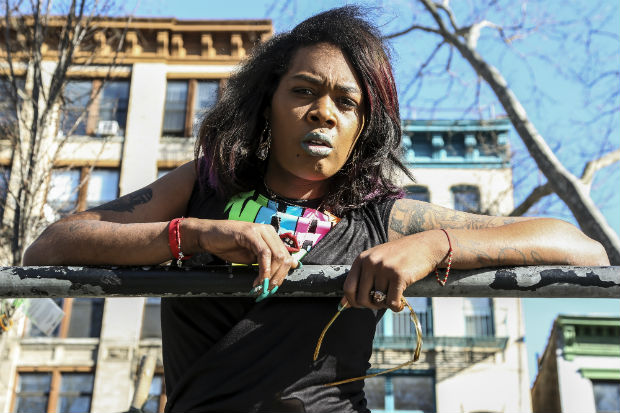
It’s New Year’s Eve and there’s a general joyousness flowing through the predominantly white crowd gathered by Washington Square Park’s giant Christmas tree. A few blocks away, I meet Beauty at a bar to catch up. She’s wearing a black coat and straight black hair, sipping a cocktail of sweet ale as she feels a mix of determination and frustration.
She thought she was going to grab a wider audience at a showcase that was scheduled to be held at Upper Manhattan’s West End Lounge on December 6. She and Diamond were going to perform with two other transgender artists. But the show was canceled because of poor presales, and Beauty was still sighing with exasperation at the year’s end. She believes the low numbers can be blamed on how she and Lucas were the only two people actively promoting the gig.
To her, working with artists who lack dedication isn’t just a nuisance but also pernicious. “These females talking about, ‘Oh, they serious,’” Beauty says, also agitated by cold-induced coughs. “But all they do is post selfies on Facebook and really don’t share their music every day like I do.”
After the canceled show, Beauty contemplated moving to Atlanta. The idea wasn’t motivated by bitterness: Atlanta is still hip-hop’s center and she’d get studio time easier with the Trans Entertainment Network’s help. But Beauty decided to grind it out in New York after she got a job as a deliverer at Postmates, a mobile app service that delivers a variety of products from restaurants and retail stores. With the extra money, she’ll be able to fund her music career as well as start looking for a place to live so that she could leave her shelter.
Perhaps the biggest drawback of Beauty’s decision to stay in New York is the fact that T.E.N. has a limited means of financially supporting her — it’s still dedicating its resources to establishing itself. But Atlanta’s position as hip-hop’s creative capital doesn’t trump New York’s position as the music industry’s center. With Beauty, Stan Lucas’ venture has a voice, and it’s the least she could do for the man who matched her ambitions when no one else would. “I look at Stan like a father figure a little bit,” Beauty admits.
Diamond concedes that she was too busy to promote the aborted concert. She was also a T.E.N. artist at one point, but a cluttered schedule and lack of communication with Lucas made them part ways — at least for now. But Diamond isn’t lamenting too much because she’s planning to temporarily move to California to work with Justin Tranter, who got extra attention last year for writing smash-hit singles like Justin Bieber’s “Sorry,” Selena Gomez’s “Good for You,” and Hailee Steinfeld’s “Love Myself.”
Tranter first saw Diamond when a New York friend sent him a YouTube video of her performing “I Am Her” at an event hosted by the Audre Lorde Project, a Brooklyn-based organization dedicated to supporting queer people of color. His interest was piqued by “her lyrical awareness and her voice” before he finally met Diamond in person at Cyndi Lauper’s “Home for the Holidays” concert this past December.
His willingness to work with Diamond also comes from a place of empathy; as a gay songwriter and musician, he’s been on the receiving end of homophobic hate. Tranter recalls opening for Lady Gaga with his band Semi Precious Weapons. His group was playing ahead of an LGBTQ icon and still got hit with vitriol, even though Tranter is the only non-straight member of the band: “You’d get on Twitter and you’d see, and I think this is the exact quote, ‘Someone get these five AIDS trannies off the stage,’” Tranter recalls. “And the funniest part is that there’s only four of us.”
After having a breakthrough year in 2015, Tranter hopes he can help other LGBTQ artists who’re up against the same kind of prejudice. “I just feel it’s such an honor to not only put my queer ideas into mainstream pop songs that I’m writing,” Tranter says, “but to also be able to work with someone like ShaGasyia Diamond where I can give her very-needed voice a little more exposure — and also just to collaborate with someone who I think is really talented.”
That Afropunk gig from last August still stands as Diamond’s largest audience. But on one rainy Wednesday night in October, she performed two songs in Harlem’s National Action Network center, a mid-sized meeting space with a storefront exterior not too dissimilar from a grocery store’s. This was an LGBT open mic attended by a crowd of about a dozen that included fellow artists, activists and supporters. There were dozens of rows of empty burgundy chairs behind them. Like Afropunk, it’s a space that promotes freedom.
Her natural singing talent was front-and-center in an a cappella performance, and she especially shined with her second song, a powerful rendition of the gospel hymn “His Eye Is on the Sparrow.” The small audience was silent but engaged, truly listening to her. For years, she’s been silenced by societal prejudice, which still exists outside the venue’s walls. But for four minutes, both the 37-year-old Bronx artist and the 5-year-old in Memphis were free.

